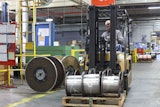Four companies in New Jersey, three from upstate New York and a federal lab on Long Island, have been recognized by the U.S. Environmental Protection Agency (EPA) as the newest partners in a national voluntary program whose members have collectively pledged to eliminate over five million pounds of toxic chemicals, including over three million pounds of priority chemicals, by 2008. All of the chemicals considered "priority" chemicals by EPA are persistent, bioaccumulative, and/or toxic in the environment.
Comus International: As a mercury switch manufacturer, Comus's goal is to reduce the amount of mercury used each year by developing non-mercury replacements. The company pledges to reduce 2,500 lbs of mercury by July 2010, while at the same time increasing recycling to 4,000 lbs. The change will ultimately eliminate 8,000 lbs of mercury.
Crystex Composites LLC: Crystex will eliminate by December 2008, 12,000 lbs of lead from its leaded glass-bonded-mica used in multiple industries, through product redesign, and the substitution of less toxic raw materials. The company will also recycle 5,000 lbs of lead by December 2007.
Durand Glass Mfg Co.: Durand's goal is to reduce the lead it uses in its glass decorating processes by 80% using lead- free paints, and expects to phase out lead paint by June 2006, ultimately eliminating 24,000 lbs of lead from its final products.
GGB LLC: The company modified its equipment and process to reduce the amount of lead powder used in the manufacturing of bearing liner material by 17,000 lbs by the end of last month. It will also increase recycling and recovery of lead to 19,000 lbs by September 2006 by redesigning equipment.
Anderson Instrument Co. Inc.: In January 2006, the company completed the phase out of its mercury thermometers product line, used in the food and dairy industry, and eliminated 500 lbs of mercury per year by replacing it with electronic alternatives.
Brookhaven National Laboratory: The lab will reduce its inventory of transformers containing PCBs, eliminating the use of 2,315 lbs of PCBs by December 2006. Brookhaven will also modify its equipment and technology to reduce the use of mercury by 40 lbs. It will also decrease its lead inventory that is used to shield workers from radiation.
Eastman Kodak: Eastman Kodak's corporate goal is to have 95% of all new equipment free of lead solder by the end of 2008, eliminating over 1,000 lbs of lead. In addition, Eastman Kodak pledged to reduce the use of methylene chloride by 337,000 lbs through a process and equipment modification that started in December 2002.
Sanmina-SCI Corp: The corporation will eliminate 1,000 lbs of lead by December 2006 by substituting less toxic raw material and developing low-cost alternatives for the lead used in its products, with the goal of ultimately eliminating 19,000 lbs of lead.



















